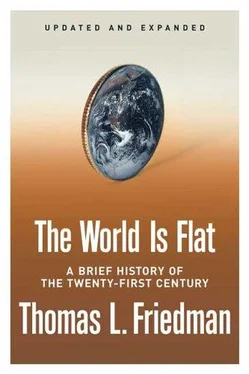If societies are unable to manage the strains that are produced by this flattening, there will be a backlash, and political forces will attempt to reinsert some of the frictions and protectionist barriers that the flattening forces have eliminated, but they will do it in a crude way that will, in the name of protecting the weak, end up lowering everyone's standard of living. Former Mexican president Ernesto Zedillo is very sensitive to this problem, having had to manage Mexico's transition into NAFTA, with all of the strains that put on Mexican society. Speaking of the flattening process, he said to me, “It would be very hard to stop, but it can be stopped for a time. Maybe you can't stop it totally, but you can slow it down. And it makes a difference whether you get there in twenty-five years or fifty years. In between, two or three generations-who could have benefited a lot from more trade and globalization-will end up with crumbs.”
Always remember, said Zedillo, that behind all this technology is a political infrastructure that enables it to play out. “There have been a series of concrete political decisions, taken over the last fifty years, that put the world where it is right now,” he said. “Therefore, there are political decisions that could screw up the whole process too.”
As the saying goes: If you want to live like a Republican, vote like a Democrat-take good care of the losers and left-behinds. The only way to be a flatist is to be a compassionate flatist.
Social Activism
One new area that is going to need sorting out is the relationship between global corporations and their own moral consciences. Some may laugh at the notion that a global corporation even has a moral conscience, or should ever be expected to develop one. But some do and others are going to have to develop one, for one simple reason: In the flat world, with lengthy global supply chains, the balance of power between global companies and the individual communities in which they operate is tilting more and more in favor of the companies, many of them American-based. As such, these companies are going to command more power, not only to create value but also to transmit values, than any transnational institutions on the planet. Social and environmental activists and progressive companies can now collaborate in ways that can make both the companies more profitable and the flat earth more livable. Compassionate flatism very much seeks to promote this type of collaboration.
Let me illustrate this notion with a couple of examples. If you think about the forces that are gobbling up biodiversity around the planet, none are more powerful than farmers. It is not that they are intending to be harmful, it is just in the nature of what they do. So how and where people farm and fish really matter to whether we preserve natural habitats and species. Conservation International, one of the biggest environmental NGOs in the world, has as its main mission preserving biodiversity. It is also a big believer in trying, when possible, to collaborate with big business, because when you bring a major global player around, it can have a huge impact on the environment. In 2002, McDonald's and Conservation International forged a partnership to use the McDonald's global supply chain-a behemoth that sucks beef, fish, chicken, pork, bread, lettuce, pickles, tomatoes, and potatoes from all four corners of the flat world-to produce not just value but also different values about the environment. “We and McDonald's looked at a set of environmental issues and said, 'Here are the things the food suppliers could do to reduce the environmental impact at little or no cost,'” explained Glenn Prickett, senior vice president of Conservation International.
McDonald's then met with its key suppliers and worked out, with them and with CI, a set of guidelines for what McDonald's calls “socially responsible food supply.” “For conservationists the challenge is how do you get your arms around hundreds of millions of decisions and decision makers involved in agriculture and fisheries, who are not coordinated in any way except by the market,” said Prickett. “So what we look for are partners who can put their purchasing power behind a set of environmentally friendly practices in a way that is good for them, works for the producers, and is good for biodiversity. In that way, you can start to capture so many more decision makers... There is no global government authority to protect biodiversity. You have to collaborate with the players who can make a difference, and one of them is McDonald's.”
Conservation International is already seeing improvements in conservation of water, energy, and waste, as well as steps to encourage better management of fisheries, among McDonald's suppliers. But it is still early, and one will have to assess over a period of years, with comprehensive data collection, whether this is really having a positive impact on the environment. This form of collaboration cannot and should never be a substitute for government rules and oversight. But if it works, it can be a vehicle for actually getting government rules implemented. Environmentalists who prefer government regulation to these more collaborative efforts often ignore the fact that strong rules imposed against the will of farmers end up being weakly enforced-or not enforced at all.
What is in this for McDonald's? It is a huge opportunity to improve its global brand by acting as a good global citizen. Yes, this is, at root, a business opportunity for McDonald's. Sometimes the best way to change the world is by getting the big players to do the right things for the wrong reasons, because waiting for them to do the right things for the right reasons can mean waiting forever. Conservation International has struck similar supply-chain collaborations with Starbucks, setting rules for its supply chain of coffee farmers, and Office Depot, with its supply chain of paper-product providers.
What these collaborations do is start to “break down the walls between different interest groups,” said Prickett. Normally you would have the environmentalists on one side and the farmers on the other and each side trying to get the government to write the regulations in the way that would serve it. Government would end up writing the rules largely to benefit business. “Now, instead, we have a private entity saying, 'We want to use our global supply chain to do some good,' but we understand that to be effective it has to be a collaboration with the farmers and the environmentalists if it is going to have any impact,” Prickett said.
In this same vein, as a compassionate flatist, I would like to see a label on every electronics good state whether the supply chain that produced it is in compliance with the standards set down by the new HP-Dell-IBM alliance. In October 2004, these three giants joined forces in a collaborative effort with key members of their computer and printer supply chains to promote a unified code of socially responsible manufacturing practices across the world. The new Electronics Industry Code of Conduct includes bans on bribes, child labor, embezzlement and extortion, and violations of intellectual property, rules governing usage of wastewater, hazardous materials, pollutants, and regulations on the reporting of occupational injuries. Several major electronics manufacturers who serve the IBM, Dell, and HP supply chains collaborated on writing the code, including Celestica, Flextronics, Jabil, Sanmina-SCI, and Solectron.
All HP suppliers, for instance, will be required to follow the code, though there is flexibility in the timing of how they reach compliance. “We are completely prepared and have terminated relationships with suppliers we find to be repeatedly nonresponsive,” said HP spokeswoman Monica Sarkar. As of October 2004, HP had assessed more than 150 of its 350 suppliers, including factories in China, Mexico, Southeast Asia, and Eastern Europe. It has set up a steering committee with IBM and Dell in order to figure out exactly how they collectively can review compliance and punish consistent violators. Compliance is everything, and so, again, it remains to be seen just how vigilant the corporations will be with their suppliers. Nevertheless, this use of supply chains to create values-not just value-could be a wave of the future.
Читать дальше












